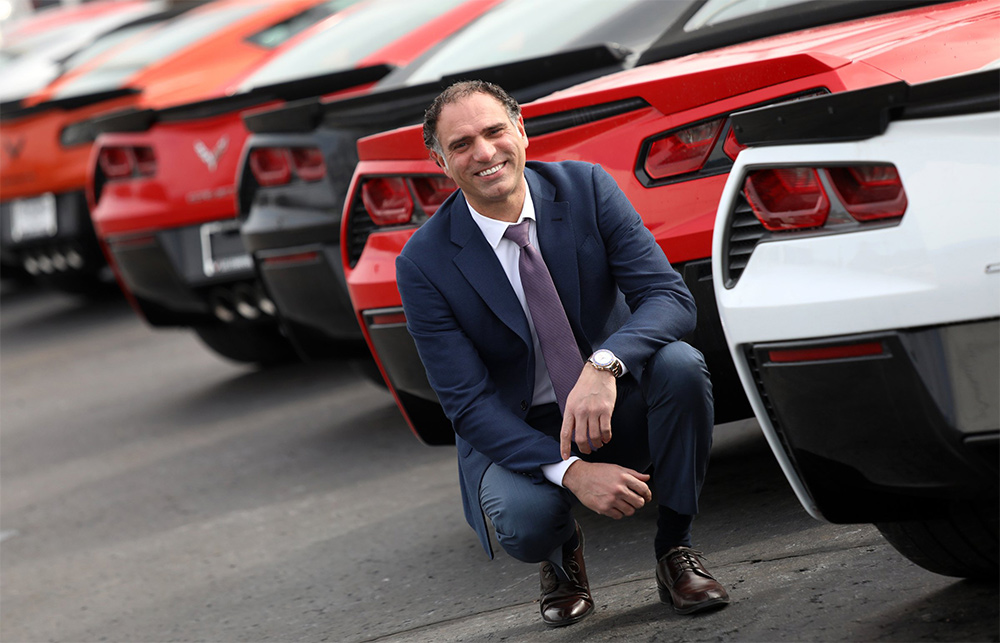疫情期间,美国大多数州都实施了封锁措施。数以百万计的美国人因此失业,汽车经销商被勒令关闭,销售额骤降,行业前景毫不乐观。如果此时美国汽车销售冠军说“疫情是个大机会”,肯定没人会相信,但阿里·瑞达对疫情的看法确实如此。瑞达在密歇根州迪尔伯恩的汽车经销商Les Stanford销售雪佛兰和凯迪拉克,2017年,他共售出1530辆新车和52辆二手车,打破了保持44年的销售记录,一举成为全美汽车销售冠军。他成功的秘诀和他眼中的机会,对疫情冲击下的各行业从业者而言,无疑都是宝贵的经验。
47岁的瑞达是所有销售员心中的偶像。他说:“我只给自己认识的人推荐车。”他们要么是我的老客户,要么就是其他人介绍的新客户。
既然每个打电话的人都想从他那儿买车,你就不能再把他看作是销售员了。“新客户会告诉我他们开的是什么车,而老客户不用说,我也知道,”他说,他不仅知道他们是谁,从哪来,更重要的是,我还能看到客户生活的新动向,比如:他们是要结婚、生孩子还是要换工作,以后会不会经常开车?
当他掌握了这些信息,顾客就会放心地向他征求购车建议。他说什么,客户也都会欣然接受。他说:“我要做的是客户的顾问,而不是销售员。”
这是一种蜕变,然而大多数销售人员永远无法做到。瑞达深知缘由,用他的话来说“这种成长在经销商那可学不到,更多的是需要在工作之外下功夫——要赢得自己所在社区的信任。”瑞达说:“这没有数年的努力是不可能做到的,大多数销售人员失败的原因只是他们过早地选择了放弃。

现在我们开始理解为什么新冠疫情对瑞达而言是一个机会了。多年来,他一直协助当地非营利组织在迪尔伯恩地区开展健康、教育、就业、营养等方面的工作。对他来说,新冠肺炎是“一个很好的切入点,让我们可以更好地为社区做点事情。因为疫情关系着每个人,你的每一份付出都会比平时更快地获得更多的认可。”
新冠疫情早期,个人防护用品严重短缺,瑞达想尽办法购买了几千个口罩,然后他通过短信和社交媒体,向医疗工作者或他们的家人发布消息称“需要口罩,请联系我”。 他回忆道,“消息传播的速度难以置信得快。我和我的助手开着车挨家挨户去送口罩,每家两到六个不等。”
请求增多后,他建立了一个名为Dearborn Cares的网站,呼吁人们把个人防护用品放在经销商处,由经销商协代为发放。网站上还提供了新冠肺炎测试点、当地有外卖和送货服务的餐馆以及其他信息。在网站首页的顶端是一段瑞达的视频,下拉到网页底部,你会看到他的电话号码和邮箱地址。
“我就是这样让人们认识我的,” 瑞达说,“人们更愿意和他们认识的人做生意,特别是那些回馈社会的人。”
如果只看瑞达的简历,你绝想不到他能成为创纪录销售冠军。他说:“我生活在底特律的一个单亲家庭,跟母亲一起长大,在底特律公立学校上学。但我不会让出身决定自己的人生道路。”2001年,当他意识到他需要继续前进时,他已经在一个仓库工作了10年。一家汽车经销商雇佣了他,“我只是入了行,当时我对汽车销售一无所知。不过,我很快意识到做好这份工作的关键是人,而不是销售的车。”
2008年和2009年金融危机期间,通用汽车关停了他所在的汽车经销店,走投无路的他采取了以社区为中心的方法。他说:“这可能是我所遇到的最好的事情了,我在想,接下来‘我该怎么做?’”他到Les Stanford工作后,积极践行新的销售理念,“并且和社区一起成长,我深爱着社区,社区也给了我回报。”几年时间里,他的汽车月销售量就从不超过30辆增长到130辆。2018年12月,他一个月卖出202辆车,再次创造了汽车销售纪录。
瑞达在疫情到来时的乐观心态,与这段在金融危机中的经历不无关系。汽车零售业看起来要又一次失败,但他知道事实并非如此。依靠庞大的社区网络,他接到的购车电话从没间断过。销售情况属于竞争性信息,瑞达和几乎所有汽车销售人员一样,都不喜欢说自己卖了多少车,但我们知道他的生意应该还很不错,因为经销商雇佣了两名助理来处理他的日程安排和文书工作。
现如今被问及他对商界人士的建议时,他的回答很简短:“要有耐心”。他已经证明了这是一种行之有效,但不可能一蹴而就的方法。这算不上是坏消息,假如这个方法能够快速、轻松地让一个人成为世界级强者,那么所有人都能做到。瑞达的故事让人备受鼓舞,道理浅显,道路漫长,只有愿意坚持的人,才会走向成功。(财富中文网)
译者:梁宇
审校:夏林
疫情期间,美国大多数州都实施了封锁措施。数以百万计的美国人因此失业,汽车经销商被勒令关闭,销售额骤降,行业前景毫不乐观。如果此时美国汽车销售冠军说“疫情是个大机会”,肯定没人会相信,但阿里·瑞达对疫情的看法确实如此。瑞达在密歇根州迪尔伯恩的汽车经销商Les Stanford销售雪佛兰和凯迪拉克,2017年,他共售出1530辆新车和52辆二手车,打破了保持44年的销售记录,一举成为全美汽车销售冠军。他成功的秘诀和他眼中的机会,对疫情冲击下的各行业从业者而言,无疑都是宝贵的经验。
47岁的瑞达是所有销售员心中的偶像。他说:“我只给自己认识的人推荐车。”他们要么是我的老客户,要么就是其他人介绍的新客户。
既然每个打电话的人都想从他那儿买车,你就不能再把他看作是销售员了。“新客户会告诉我他们开的是什么车,而老客户不用说,我也知道,”他说,他不仅知道他们是谁,从哪来,更重要的是,我还能看到客户生活的新动向,比如:他们是要结婚、生孩子还是要换工作,以后会不会经常开车?
当他掌握了这些信息,顾客就会放心地向他征求购车建议。他说什么,客户也都会欣然接受。他说:“我要做的是客户的顾问,而不是销售员。”
这是一种蜕变,然而大多数销售人员永远无法做到。瑞达深知缘由,用他的话来说“这种成长在经销商那可学不到,更多的是需要在工作之外下功夫——要赢得自己所在社区的信任。”瑞达说:“这没有数年的努力是不可能做到的,大多数销售人员失败的原因只是他们过早地选择了放弃。
现在我们开始理解为什么新冠疫情对瑞达而言是一个机会了。多年来,他一直协助当地非营利组织在迪尔伯恩地区开展健康、教育、就业、营养等方面的工作。对他来说,新冠肺炎是“一个很好的切入点,让我们可以更好地为社区做点事情。因为疫情关系着每个人,你的每一份付出都会比平时更快地获得更多的认可。”
新冠疫情早期,个人防护用品严重短缺,瑞达想尽办法购买了几千个口罩,然后他通过短信和社交媒体,向医疗工作者或他们的家人发布消息称“需要口罩,请联系我”。 他回忆道,“消息传播的速度难以置信得快。我和我的助手开着车挨家挨户去送口罩,每家两到六个不等。”
请求增多后,他建立了一个名为Dearborn Cares的网站,呼吁人们把个人防护用品放在经销商处,由经销商协代为发放。网站上还提供了新冠肺炎测试点、当地有外卖和送货服务的餐馆以及其他信息。在网站首页的顶端是一段瑞达的视频,下拉到网页底部,你会看到他的电话号码和邮箱地址。
“我就是这样让人们认识我的,” 瑞达说,“人们更愿意和他们认识的人做生意,特别是那些回馈社会的人。”
如果只看瑞达的简历,你绝想不到他能成为创纪录销售冠军。他说:“我生活在底特律的一个单亲家庭,跟母亲一起长大,在底特律公立学校上学。但我不会让出身决定自己的人生道路。”2001年,当他意识到他需要继续前进时,他已经在一个仓库工作了10年。一家汽车经销商雇佣了他,“我只是入了行,当时我对汽车销售一无所知。不过,我很快意识到做好这份工作的关键是人,而不是销售的车。”
2008年和2009年金融危机期间,通用汽车关停了他所在的汽车经销店,走投无路的他采取了以社区为中心的方法。他说:“这可能是我所遇到的最好的事情了,我在想,接下来‘我该怎么做?’”他到Les Stanford工作后,积极践行新的销售理念,“并且和社区一起成长,我深爱着社区,社区也给了我回报。”几年时间里,他的汽车月销售量就从不超过30辆增长到130辆。2018年12月,他一个月卖出202辆车,再次创造了汽车销售纪录。
瑞达在疫情到来时的乐观心态,与这段在金融危机中的经历不无关系。汽车零售业看起来要又一次失败,但他知道事实并非如此。依靠庞大的社区网络,他接到的购车电话从没间断过。销售情况属于竞争性信息,瑞达和几乎所有汽车销售人员一样,都不喜欢说自己卖了多少车,但我们知道他的生意应该还很不错,因为经销商雇佣了两名助理来处理他的日程安排和文书工作。
现如今被问及他对商界人士的建议时,他的回答很简短:“要有耐心”。他已经证明了这是一种行之有效,但不可能一蹴而就的方法。这算不上是坏消息,假如这个方法能够快速、轻松地让一个人成为世界级强者,那么所有人都能做到。瑞达的故事让人备受鼓舞,道理浅显,道路漫长,只有愿意坚持的人,才会走向成功。(财富中文网)
译者:梁宇
审校:夏林
It shouldn’t be surprising that America’s champion car salesman saw the pandemic as an opportunity. It didn’t look like one. With much of the nation in lockdown, millions suddenly jobless, car dealerships ordered shut, and sales plunging, the industry was not rife with optimism. But Ali Reda sees things differently. He sells Chevrolets and Cadillacs at the Les Stanford dealership in Dearborn, Mich., and in 2017, he sold more vehicles than anyone in America had ever sold in a year: 1,530 new ones and 52 used ones. He broke a record that had stood for 44 years. The way he did it, and the reason he saw opportunity in the pandemic, is rich with lessons for anyone in a business that got slammed by the coronavirus pandemic.
Reda, 47, has attained a status that virtually all salespeople aspire to. “I don’t really sell to anybody that doesn’t know of me,” he says. Everybody is a previous customer or has been referred by one.
Since everyone who calls already wants to buy a car from him, he isn’t exactly a salesman anymore. “If it’s a new customer, they tell me what [vehicle] they’re in. If it’s a repeat customer, I already know,” he says. He knows or finds out “who they are, where they are, where they’re coming from, and, more importantly, where they’re going in life. Are they getting married or having a child? Changing jobs? Are they driving more? Or less?”
When he has that information, customers tend to ask what he thinks they should do. He tells them, and they tend to do it. “I’ve really adopted an adviser-type role rather than the salesman role,” he says.
That’s a nirvana that most salespeople never reach, and Reda knows why. “It’s what you’re doing outside of the dealership more so than in the dealership,” he says, using the terminology of his business to make a point that applies broadly. “What I mean by that is earning that trust through your community. The reason why most salespeople fail at it is because they give up prematurely. It takes years and years to develop that type of relationship with the entire community.”
Now we’re getting to why the pandemic looked like an opportunity to Reda. He has been involved for “years and years” with local nonprofits that promote health, education, employment, nutrition, and more in the Dearborn area. To him, COVID-19 was “a great entry point to enter into a community with the right cause,” he says. “And because everybody is involved in it, you actually get more recognition a lot faster than you normally would.”
When PPE was in critically short supply early in the pandemic, his connections enabled him to buy “a couple of thousand masks.” He put out the word through texts and social media, asking health care workers or their families to “please reach out to me personally,” he recalls. “You can imagine how that spread like wildfire. My assistant and I drove to people’s houses dropping off two, three masks, six masks.”
As requests multiplied, he set up a website called DearbornCares asking people to drop off PPE at the dealership, which would distribute it. The site also provided information on COVID-19 testing locations, local restaurants offering takeout and delivery, and other information. At the top of the landing page is a video message from Reda, and if you scroll all the way to the bottom, there, discreetly, is his phone number and email.
“That’s how you get to be known,” he says, “And people are going to be more inclined to do business with somebody they know, somebody who has given back.”
Nothing on Reda’s résumé would have suggested he’d become a record-setting salesman. “I was raised with a single mother in inner-city Detroit. I’m a product of the Detroit public school system,” he says. “I never let where I came from dictate where I was going.” In 2001 he’d been working at a warehouse for 10 years when he realized he needed to move on. A car dealership hired him, “and I just kind of went in, not knowing anything. I quickly learned that it wasn’t about the product they were selling. It was about the people.”
He adopted his community-centered approach when he faced the desperation of the financial crisis in 2008 and 2009. General Motors shut down the dealership where he was working. “It may have been the best thing that ever happened to me,” he says. “I was thinking, ‘What am I gonna do?’” He moved to the Les Stanford dealership, adopted his current approach, “and just grew with the community. I loved them—definitely love —and it was reciprocated.” It took years, but he went from selling 25 or 30 cars a month to averaging 130 a month. In December 2018, he set another record, selling 202 cars in a month.
Reda’s experience in the financial crisis gave him optimism when the pandemic arrived. Once again, auto retailing looked doomed, but he knew it wasn’t. His long list of relationships kept his phone ringing. He appears to be doing well. Like virtually all car salespeople, he doesn’t like to say how many cars he’s selling—that’s competitive information—but the dealership still employs two assistants just to handle his scheduling and paperwork.
Asked for his advice to businesspeople today, his response is short: “It’s just going to come down to patience.” He has demonstrated what works, and it doesn’t happen overnight. That isn’t necessarily bad news. After all, if becoming world-class great were quick and easy, everyone would do it. The encouraging message of Reda’s example is that if you’re willing to do what we already know is effective, you’ll be in a class by yourself.






